In the rapidly evolving landscape of geopolitics, artificial intelligence (AI) is emerging not just as a factor but as a formidable actor, reshaping the dynamics of power and influence on the global stage. As highlighted in a recent article by Barry Pavel [RAND], the implementation of AI technologies presents a dual challenge and opportunity, with the private sector currently in the lead. However, the ease of acquiring and adapting external technologies, coupled with the rise of open-source language models, is creating a borderless threat vector that demands global attention.
The economic stability of nations now hinges on their ability to harness the potential of AI. The United States, driven by its thriving private sector, is at the forefront of AI development. Meanwhile, China, with its proven strategy of appropriating foreign technologies, poses a significant contender. The adoption of open-source language models, like the French Mistral AI, is amplifying the capabilities available to private citizens, intensifying the borderless nature of this technology and heightening the potential for geopolitical implications.

In response to the escalating risks associated with AI, many nations are enacting or contemplating regulatory measures. However, the implementation of such regulations may inadvertently slow down AI development in certain regions, creating an opportunity for countries with looser restrictions to gain a competitive advantage. AI, in this scenario, could transform into a coveted resource, akin to petroleum, dictating not only new global power structures but also hastening the decline of established ones.
«The economic stability of nations now hinges on their ability to harness the potential of AI»
Europe stands at a crossroads in this AI-driven transformation. As the European Union contemplates new regulations governing AI, it seeks to balance innovation with the need to protect consumers and the public. The proposed regulations categorize AI into four risk levels, each with its set of rules and obligations for users and providers. While these measures may appear as hurdles for AI companies in Europe, the European Parliament asserts that they are essential to mitigate international threats posed by AI systems.
The critical question that emerges from these developments is whether these regulations will truly safeguard the EU nations or potentially hinder their progress in what is evolving into a new arms race. Europe’s commitment to striking a balance between innovation and regulation reflects an awareness of the delicate equilibrium required to navigate the evolving geopolitics of AI. As the world grapples with the transformative impact of AI, nations must collaborate to establish a global framework that ensures responsible and equitable development, preventing the weaponization of AI and fostering a more secure and stable future.
Leonardo Martín – Cybersecurity Analyst
